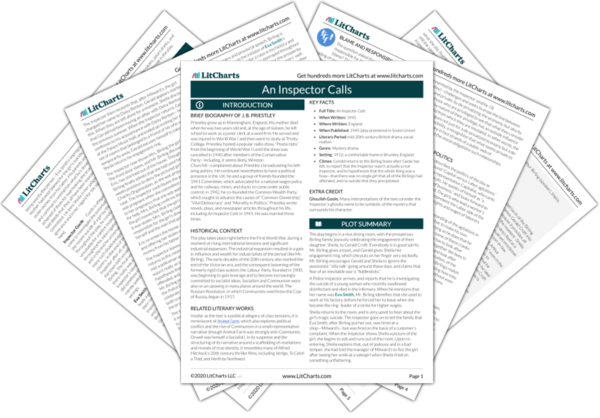Brief Biography of J. B. Priestley
Priestley grew up in Manningham, England. His mother died when he was two years old and, at the age of sixteen, he left school to work as a junior clerk at a wool firm. He served and was injured in World War I and then went to study at Trinity College. Priestley hosted a popular radio show, “Postscripts,” from the beginning of World War II until the show was cancelled in 1940 after members of the Conservative Party—including, it seems likely, Winston Churchill—complained about Priestley’s broadcasting his left-wing politics. He continued nevertheless to have a political presence in the UK: he and a group of friends founded the 1941 Committee, which advocated for a national wages policy and for railways, mines, and docks to come under public control; in 1942, he co-founded the Common Wealth Party, which sought to advance the causes of “Common Ownership,” “Vital Democracy” and “Morality in Politics.” Priestley wrote novels, plays, and newspaper articles throughout his life, including An Inspector Calls in 1945. He was married three times.
Historical Context of An Inspector Calls
The play takes place right before the First World War, during a moment of rising international tensions and significant industrial expansion. The industrial expansion resulted in a gain in influence and wealth for industrialists of the period (like Mr. Birling). The early decades of the 20th century also marked the end of the Victorian era, and the consequent loosening of the formerly rigid class system; the Labour Party, founded in 1900, was beginning to gain leverage and to become increasingly committed to socialist ideas. Socialism and Communism were also on an upswing in many places around the world. The Russian Revolution, in which Communists overthrew the Czar of Russia, began in 1917.
Other Books Related to An Inspector Calls
Insofar as the text is a political allegory of class tensions, it is reminiscent of
Animal Farm, which also explores political conflict and the rise of Communism in a small representative narrative (though Animal Farm was strongly anti-Communist, Orwell was himself a Socialist). In its suspense and the structuring of its narrative around a scaffolding of revelations and reveals of true identity, it resembles many of Alfred Hitchock’s 20th century thriller films, including
Vertigo,
To Catch a Thief, and
North by Northwest.
Key Facts about An Inspector Calls
-
Full Title: An Inspector Calls
-
When Written: 1945
-
Where Written: England
-
When Published: 1945 (play premiered in Soviet Union)
-
Literary Period: mid-20th century British drama, social realism
-
Genre: Mystery drama
-
Setting: 1912; a comfortable home in Brumley, England
-
Climax: Gerald returns to the Birling home after Goole has left, to report that the Inspector wasn’t actually a real inspector, and to hypothesize that the whole thing was a hoax—that there was no single girl that all of the Birlings had offended, and no suicide that they precipitated.
Extra Credit for An Inspector Calls
